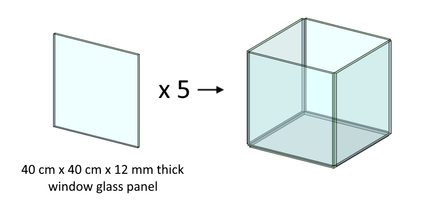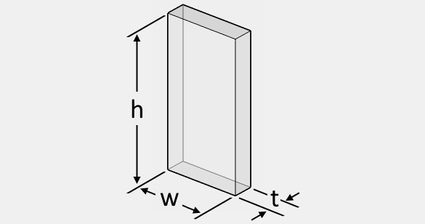Glass Weight Calculator
This glass weight calculator will help you answer questions like "What is the weight of glass?" and "How heavy is tempered glass?"
In the following article, you will learn some basic things about glass and, most importantly, how to calculate glass weight. We also included a table of the average values for the density of glass in grams per cubic centimeter (g/cm³) for your reference. Keep on reading to learn about the different densities of various types of glass and how they affect the weight of glass, regardless of its thickness or volume.
What is glass?
Glass is an amorphous non-crystalline material made by solidifying molten silica (silicon dioxide) with other chemical compounds such as soda (sodium oxide) and lime (calcium oxide). Glass is brittle, fragile, and usually transparent and colorless. Still, we can also tint and improve its structural integrity by incorporating some inorganic compounds during the manufacturing process.

Incorporating boron trioxide into the mix will yield a borosilicate glass which is more thermal shock-resistant than regular soda-lime glass. You can also add some other chemical compounds, like magnesia, alumina, potash, iron oxide, and lead oxide, which, depending on their proportions, can also improve the glass's strength and durability. This can make them a bit harder to break than regular glass (or easier if you want to break through glass like a Hollywood actor).
We can also subject glass to various processes like heat-treatment (to produce tempered glass panels and fire glasses), lamination (to produce laminated glasses for windshield and window safety glasses), sandblasting or etching (to produce frosted glasses), and so much more.
Glass has so many applications that we now see it used almost everywhere. We can see glass framed in windows, bookshelves, and picture frames. We also find it in optical instruments like lenses for telescopes, microscopes, and eyeglasses, and as glassware like drinking glasses, laboratory flasks, test tubes, manometers, and bowls.
What is the weight of a glass sheet?
The weight of glass depends on the type of glass it is made of and its dimensions. The thicker the glass is, the greater volume it has, and so the heavier it gets. Some glass types are also denser than others, depending on their chemical compositions. Here is a table of the average densities of various glass types on the market today:
Glass type | Density of glass (g/cm³) |
|---|---|
Alkali silicate | 3.0200 |
Aluminosilicate glass | 2.6400 |
Annealed glass | 2.5000 |
Blue ornamental | 2.4880 |
Borosilicate glass | 2.2300 |
Bottle glass | 2.5000 |
Crown glass | 2.5000 |
Double glazing | 2.5125 |
Flint | 3.7000 |
Laminated glass | 2.4800 |
Lead crystal | 2.9600 |
Pyrex | 2.2700 |
Quartz | 2.2110 |
Red ornamental | 2.5540 |
Silica glass | 2.2000 |
Soda lime silicate glass | 2.4860 |
Tempered glass | 2.5200 |
Window glass | 2.5100 |
Zinc titania | 2.5310 |
In engineering and construction, we always want to know how heavy our materials are, and glass's weight is no exception. Glass is fragile and expensive, so handling it requires extra care for both safety and to avoid breakage.
Partition walls used in offices and malls or the exterior glass curtains and windows that extend from floor to ceiling are extremely heavy and require sufficient support so that they don't fall on anyone. Knowing the glass's weight also helps us gauge how many people are needed to carry a glass sheet or how much multiple glass sheets would weigh on a delivery truck.
How to use our glass weight calculator?
Now that you understand the importance of knowing the weight of glass, let's learn how to find the weight of any glass material using our glass weight calculator:
- Select the glass type you desire. This will then display the density of that type of glass. If you want to check what the density of glass in
lb/in³is, you can simply change the unit next to its value. - If you know the density of the glass type you are checking, you can enter it in the density field of our glass weight calculator.
- Select the shape of your glass piece and input its dimensions in the appropriate fields.
- Finally, enter the quantity of your glass pieces to find the total weight.
How to calculate glass weight using the density of glass?
Determining glass weight is very similar to finding the weight of materials in the shape of a plate or sheet. To find the weight of a particular glass sheet, we have to multiply its density by its volume, as shown in the formula below:
glass weight = glass density × glass volume
You can look up your glass sheet's density in our glass density table from the previous section. On the other hand, you can obtain the volume of your glass sheet by multiplying its area by its thickness, like in the following equation:
glass volume = glass area × glass thickness
If your glass material is in another shape, like a cylinder, cone, or prism, you can check their corresponding volume formulas in our volume calculator.
Now that we know how to calculate glass weight let us consider an example to understand the procedure further.
Sample calculation of glass weight

Let's say we want to build a cube-shaped aquarium made out of 5 pieces of 40 cm × 40 cm × 12 mm window glass sheets. To find the weight of a single sheet, we first have to obtain its volume by using the equation below :
glass volume = glass area × glass thickness
glass volume = 40 cm × 40 cm × 1.2 cm
glass volume = 1,920 cm³
Since we calculated the volume of a single sheet in cubic centimeters (cm³), we can multiply it by the grams per cubic centimeter density of glass (g/cm³) to directly obtain the glass weight in grams (g). From our table of glass densities, we can see that window glass density is 2.51 g/cm³. We can then find what the weight of a glass sheet as follows:
glass weight = glass density × glass volume
glass weight = 2.51 g/cm³ × 1,920 cm³
glass weight = 4,819.2 g = 4.8192 kg ≈ 4.82 kg
Since we need 5 sheets of this window glass, their total weight would be 4.82 kg × 5 = 24.1 kg. That's quite a heavy lift! To know how much water to put in this aquarium, you can check out our aquarium calculator or our tank volume calculator.
If you're wondering how heavy a tempered glass aquarium is, simply repeat the steps above, but multiply the volume obtained by the density of tempered glass, which is about 2.52 g/cm³. That's it! 🙂
🙋 Of course, don't forget to seal your glass joints with sealant. Check our sealant calculator to find out how much sealant you'll need for your gap-sealing projects. 🙂
How do I calculate glass weight in kilograms?
To find the weight of a glass panel in kilograms,
- First, measure your glass dimensions (length, width, and thickness) in centimeters.
- Then, obtain its volume by multiplying all these figures together.
- Multiply this volume by 2.5 g/cm³ to estimate its weight in grams.
- Finally, divide this weight by 1000 to get its weight in kilograms.
How much does glass weight per cubic foot?
A cubic foot of ordinary window glass weighs approximately 157 pounds or around 71 kilograms. However, a heavier type of glass, like lead crystal glass, weighs heavier at around 185 pounds per cubic foot. Flint glass even weighs even more at around 230 pounds per cubic foot. Different glass types differ in weights due to the compounds added to them during the manufacturing process.
How much does a window glass weigh?
Window glass weighs 2.51 grams per cubic centimeter of volume. A square meter of window glass with a thickness of 1 cm would weigh around 25.1 kg. By multiplying this weight by 2.54 cm, which equals 1 inch, we can then determine the weight of a 1-inch thick square meter window glass to be around 63.75 kg or around 140 pounds.
What is the density of glass in kg/m³?
The density of glass ranges from around 2,200 kg/m³ to around 3,700 kg/m³ and sometimes even more. Annealed glass is typically set to 2,500 kg/m³, while tempered glass's density is around 2,520 kg/m³. Other glass types like the borosilicate glass, even though they are treated to withstand high temperatures, are surprisingly lighter at around 2,230 kg/m³.
How heavy is a 1/2" tempered glass panel?
A 1/2" tempered glass panel weighs around 6.5 lbs/ft². Using this figure, we can say that a 4 ft × 8 ft (or 32 square feet) tempered glass panel used as an office partition would weigh around 208 lbs! Extreme care must be observed when handling such a heavy material to avoid breakage or any injury.
